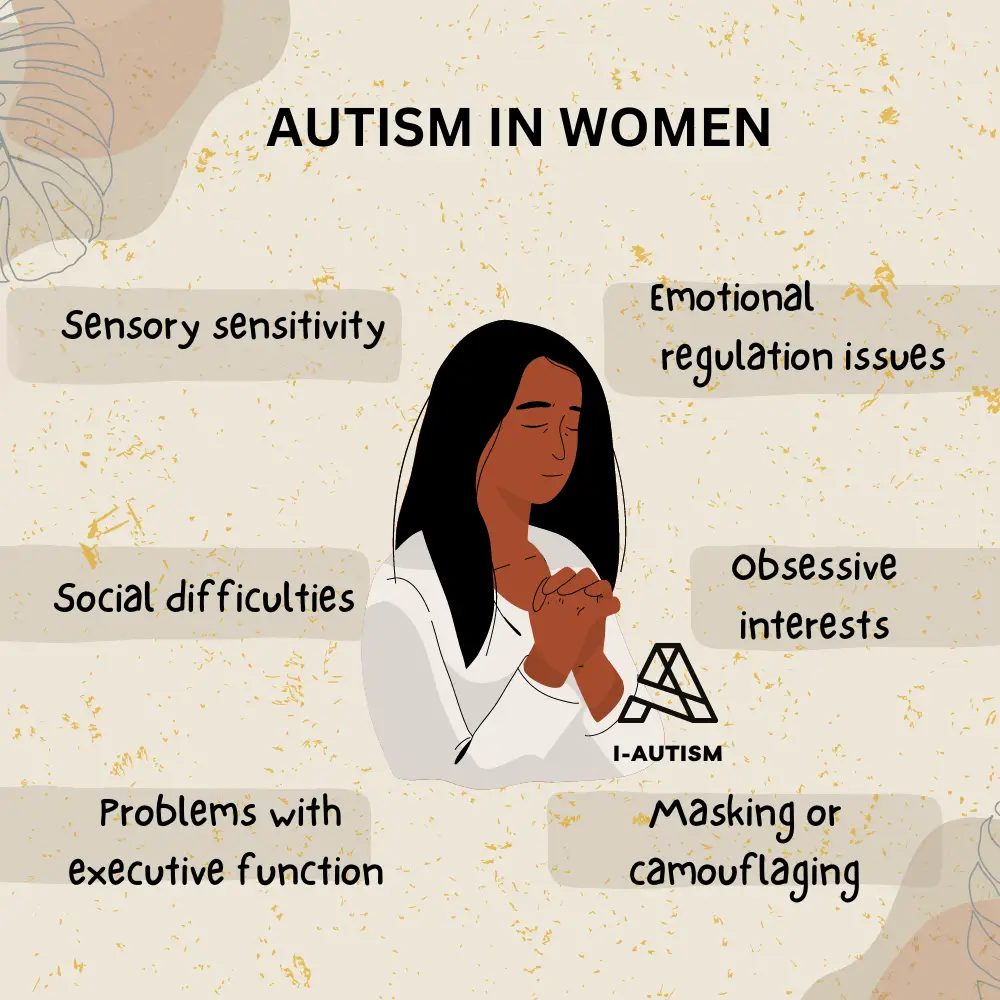Autism is a neurodevelopmental disorder that affects communication and social skills. Although there are more men than women with autism, the symptoms of autism can appear differently in women than they do in men. This can make it difficult for women with the disorder to get diagnosed and receive appropriate treatment.
There is a lack of studies on autism in women.
There is a lack of studies on autism in women. As a result, we don’t know as much about how autism affects them or what treatments may be best for them. Research shows that females with autism were more likely to have each additional condition than males, including intellectual disabilities, suggesting they may have more severe autism than males and adding evidence that autism may be currently underdiagnosed in more intellectually able females.
Studies show that there are many more men with autism than women–about 4 times as many in the U.S., for example. This difference might be due to fewer girls being diagnosed with ASD than boys because it takes longer for them to show symptoms or get help (for example, they might not receive an early diagnosis). It could also be because girls are often better at hiding their symptoms or pretending they don’t have them at all.
Women with ASD often find it challenging to ask for help when they need it and so may struggle more than men in school and work situations where asking questions is expected from everyone else but not from them
Women with autism may have less severe symptoms than men.
Women with autism are often less socially awkward than men. They may be better at masking their symptoms, which can delay diagnosis.
Some women with autism will have fewer repetitive behaviors than men. It’s not clear why this happens, but it could be related to differences in how the brain develops or differences in hormones during pregnancy that affect brain development (since women have higher levels of estrogen).
Women tend to have less severe symptoms than men–they may have fewer social difficulties or less repetitive behaviours. This could mean that some women are able to hide their symptoms better than others or that they are diagnosed later than men because their families don’t recognize the signs as quickly as they would for boys who seem more obviously different from other children around them

Women are often diagnosed later in life than men.
Women are often diagnosed later in life than men. This is because many of the symptoms of autism spectrum disorder (ASD) are more subtle in women, and they may not be recognized as having an ASD until their 30s or 40s. Studies show that general expectancy biases and gender-stereotypes may impede the timely recognition of autism in females.
Women can also be more likely to be diagnosed with Asperger’s syndrome, a milder version of autism that affects communication skills but doesn’t affect intelligence or cognitive ability. Studies show that girls who have high-functioning autism are less likely to be diagnosed than boys with similar symptoms because they have fewer behavioural problems and better social skills. This means that some women may not even realize they’re autistic until much later in life–and by then it will be harder for them to get help from doctors who aren’t familiar with ASD diagnoses in women.
Women are also more likely than men to camouflage their autism symptoms and may be at higher risk for many health and mental health conditions.
Women with autism often find it challenging to ask for help.
Women with autism often find it challenging to ask for help. This can be due to the fact that women are socialized differently from men, and therefore may not have developed the same social skills as their male counterparts. Women may also internalize their problems, rather than seek assistance from others when they need it. In addition, some studies suggest that perfectionism is more common among women than among men; this trait could make it difficult for an individual with autism spectrum disorder (ASD) to seek assistance because she feels she cannot ask anyone else if there’s something wrong with her work or if what she’s doing is okay–she already knows the answer will be “no.” Finally, research suggests that people who struggle socially may be less likely than others to express themselves assertively when they want something done differently; such individuals may avoid making requests altogether because they’re afraid of being perceived negatively by others
Some women with autism have meltdowns when stressed.
Some women with autism have meltdowns when stressed. Meltdowns are an emotional outburst that can happen when a person is stressed, anxious, or frustrated. They can be physical or verbal–and they may involve yelling or crying.
Some women with autism have sensory issues that make them more likely to experience sensory overload (a feeling of being overwhelmed by the senses). This can cause meltdowns if your child is unable to process all the information coming in at once through her senses. For example: if there’s too much noise in the room where she’s playing; if someone bumps into her on purpose; if her favourite toy breaks… These situations might trigger an overreaction from your child–which might look like a meltdown.
But there are ways you can help prevent this kind of thing from happening: try taking some time out for yourself so you’re not tired when interacting with others; give yourself plenty of warning before introducing new experiences into daily routines; use visual aids such as picture schedules/checklists when possible so everyone knows what needs doing next…
Women with autism can find social situations overwhelming and stressful.
A woman with autism can find social situations overwhelming and stressful. She may have difficulty understanding the subtleties of conversation, such as when it’s appropriate to offer a joke or back-and-forth banter. She might also have trouble reading body language, which makes it hard for her to understand how others feel about what they’re saying or doing.
This can lead to difficulties in making friends and building relationships with others, especially if she doesn’t know how to ask for help when she needs it. In some cases, women who were diagnosed later in life report having lived with undiagnosed symptoms throughout childhood and adolescence–including depression caused by feeling different from other girls their age; anxiety around boys; difficulty making friends; trouble keeping up with schoolwork due to impaired executive functioning skills (organizing thoughts into words); feelings of isolation from peers because they couldn’t relate well socially through conversation or playtime activities like going out together after school
Women with autism may have difficulty understanding the motivations of other people in their lives and may overanalyze those motivations.
Women with autism may have difficulty understanding other people’s motivations in their lives and may overanalyze those motivations.
Women with autism may be more likely than men to be on the spectrum, but they are less likely to be diagnosed because of how their symptoms manifest differently from those of males. For example, some women with autism have difficulty reading social cues or expressing themselves verbally; these characteristics are typically associated with Asperger’s syndrome rather than full-blown autism spectrum disorder (ASD).
Accordingly, women might not seek out treatment until they reach adulthood because they do not recognize that anything is wrong or different about themselves until then–and even then it can take years before receiving an accurate diagnosis.
Autism can look different in women than in men, but women with the disorder face many similar challenges as men do
Autism is a neurodevelopmental disorder that can be diagnosed in early childhood and is characterized by difficulties with social interaction, communication and behavior.
Although there are many similarities between autism in women and men, some symptoms of the condition may be less severe for women than for men. This can make it difficult to diagnose a woman with autism until later in life or even during adulthood.
Females with autism were more likely to have each additional condition than males, including intellectual disabilities, suggesting they may have more severe autism than males and adding evidence that autism may be currently underdiagnosed in more intellectually able females.
Women also tend to find it more challenging to ask for help when they need it because they don’t want others to think of them as weak or incompetent; this reluctance may lead them down a path toward isolation from other people who could potentially provide support if only she would reach out!
Furthermore, women tend not only to experience greater anxiety during social situations but also feel overwhelmed more easily when compared with their male counterparts.”
Conclusion
There are many misconceptions about autism in women, but the truth is that it affects both men and women. Women with autism often experience social challenges, sensory issues and difficulties with communication. If you think you or someone you know may have symptoms of autism, it’s important to get help from a professional who can diagnose the condition accurately.
More:



